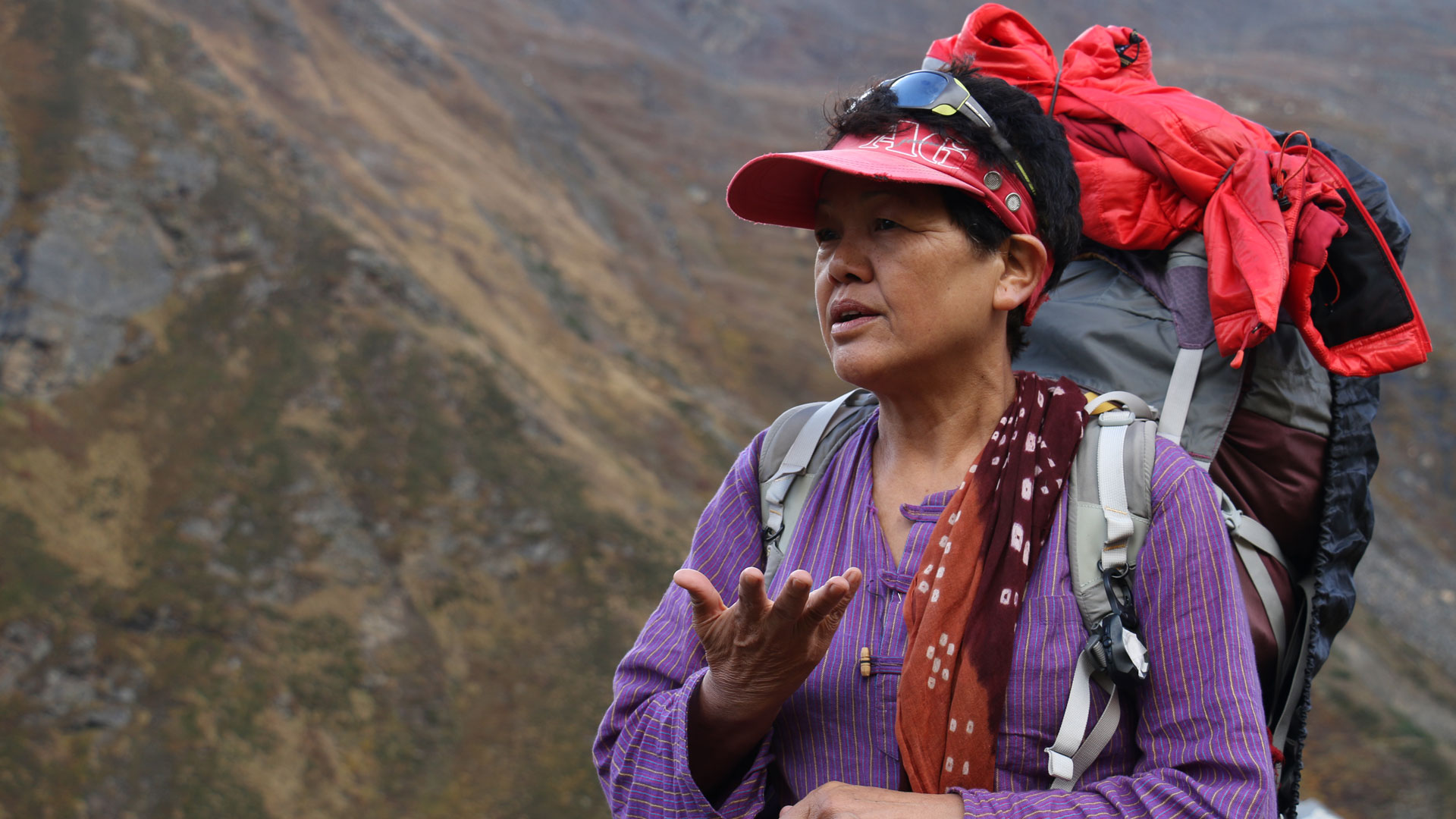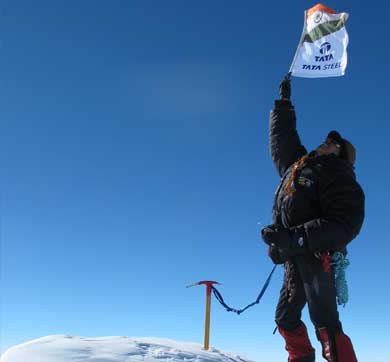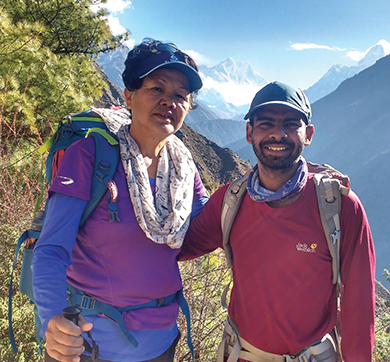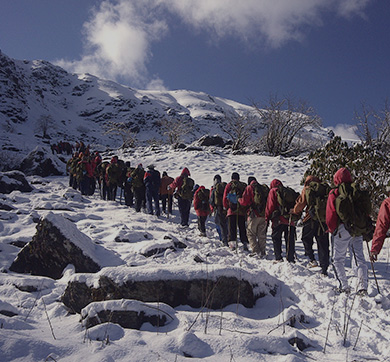March 2022 | 1122 words | 4-minute read
Imagine being the first Indian woman to climb Mount Everest, your place forever cemented in history. Most people would be content to live life, under the shadow of that achievement.
Not Bachendri Pal. The former director of the Tata Steel Adventure Foundation, and now mentor, has never been content to glory in past achievements. Even now, at 67, she is gearing up to lead a group of over-50-year-old women on an expedition to the Himalayas, determined to prove that age is but a number.
She says, “The climbing of Mount Everest is important. But for me what is more important is what I did after that. From the very real Everest, I was able to scale many figurative Everests, thanks to Tata Steel.”
It takes a village
Ms Pal’s life journey from a small village called Nakuri in Uttarkashi district of Uttarakhand to the mighty Everest was a long one. Despite strained financial conditions, the Pal family encouraged their daughter to study, an exception at a time when sons were favoured over daughters in every aspect. Ms Pal says, “Education was the key to achieving my dream of getting out of the circumstances of my village and the life of scarcity that it represented.”
“The climbing of Mount Everest is important. But for me what is more important is what I did after that. From the very real Everest, I was able to scale many figurative Everests, thanks to Tata Steel.”
She says, “I had completed my post-graduate degree with a Bachelor of Education but was unemployed for a year. There were a few job offers, but I was adamant that I would not settle for just any job.”
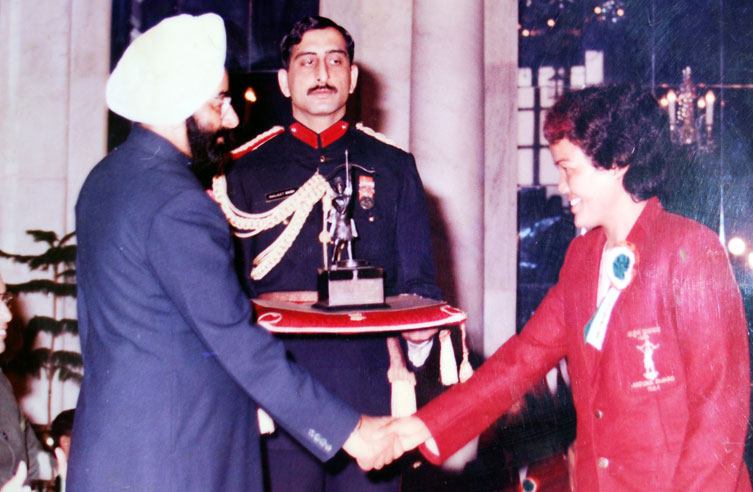
The unexpected visit of a famous mountaineer to their village set her on the road to Everest. She says, “He suggested that I do a course at the Nehru Institute of Mountaineering because there was a lot to be learned from the mountains.”
The following year, Ms Pal signed up for her mountaineering course. As predicted by the mountaineer, her learning had begun. She says, “The course instilled a sense of self-awareness in me. I learnt to get along with people despite the cultural differences there might be. My confidence rose. I learned to plan, to delegate responsibility, to work as part of a team. It was a classroom that opened my eyes to the possibilities that life had for me.”
It also helped her realise how her entire life had led her to this moment. Her parents had raised her and her brothers to value hard work. The life of hardship in the village, trudging long distances to fetch water, going to school and college 5 km away, had made her physically and mentally strong and prepared her to be ready for whatever challenges life threw her way.
That challenge turned out to be as tall as Everest. The principal of Nehru Institute of Mountaineering recommended her name for the pre-Everest selection programme. It was the first time that an Indian team would attempt to scale the highest peak in the world. If she were to get through, it would be a historic achievement. “Even then, I wasn’t sure,” says Ms Pal. “My instructor asked me, how will you know if you have it in you until you try. That’s when I became fully convinced, and never looked back.”
From the foothills to the Mount
Ms Pal was on the threshold of a great future, but the villagers of Nakuri were unimpressed. It was only when Tata Steel offered her a job that they looked at her with respect. She says, “No one in my village had heard of Mount Everest but everyone knew the Tatas.”
“My instructor asked me, how will you know if you have it in you until you try. That’s when I became fully convinced, and never looked back.”
Ms Pal joined Tata Steel at Jamshedpur, and immediately left for her intensive training. She says, “Once I climbed Everest, I got a lot of job offers. But my parents had taught me that the people who support you when you are nothing, those are the people you must remain loyal to.” It is a decision she has never regretted. Today, she passes on that lesson to others.
On returning from her historic climb, achieved on May 23, 1984, she found herself faced with another massive challenge. She says, “At a time when there was no awareness about the need for adventure, Tata Steel opened up a full-fledged department, the Tata Steel Adventure Foundation (TSAF), and put me in charge of it. I always feel proud of this visionary leadership. It empowered me and enabled me to bring about a change in people’s lives.”
In the beginning, the programme she designed as part of TSAF was purely adventure driven. The graduate engineer trainees who attended those courses would ask her how the adventure programme would benefit them in the workplace. Ms Pal would talk about self-reliance, fitness and discipline, but the answer wasn’t convincing. She wondered, “What do we learn by climbing a mountain?”
The company sent her on several study programmes abroad to help her finetune TSAF’s offerings. She says, “In New Zealand, I spent three months attending and studying an Outbound Leadership Programme. We adapted and implemented the design of that programme here.”
Wherever she went, Ms Pal took copious notes and implemented her learnings. Her hunger to learn fuelled the growth of TSAF. The adventure programme evolved into a leadership development programme.
Grow and let grow
Hard work and honesty were Ms Pal’s parents’ legacy to her. Tata Steel gave her the platform to grow. In 1993, she led the 21-member all-women Indo-Nepalese Everest expedition. It was a huge feat, given that most pathbreaking expeditions were dominated by men. The expedition notched several world records, including the largest number of persons (18) of a single expedition to climb Mount Everest, and the largest number of women (7) from a single country to climb Mount Everest. The team included six girls from Uttarkashi, including three from Ms Pal’s village.
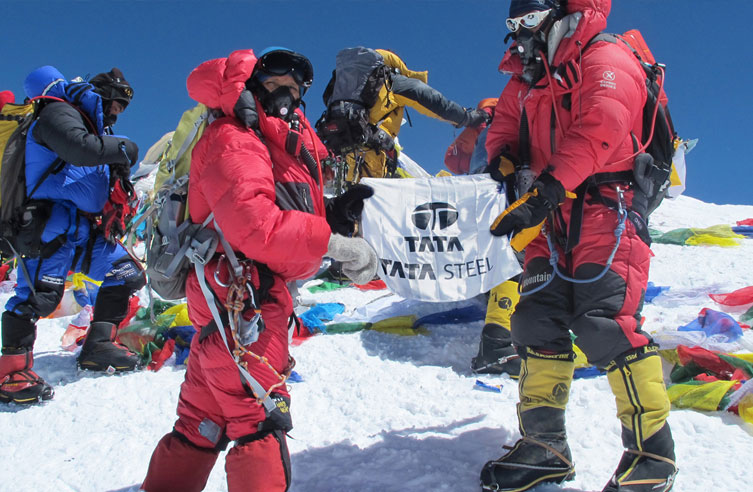
In 1994, she led an all-women team of 18 rafters from Haridwar (Uttarakhand) to Kolkata (West Bengal). She also led the first successful traverse of the Himalayas from Bomdila in Arunachal Pradesh to Siachen in 1997. Later this year, Ms Pal will lead the 9-member Fit@50+ Women’s Trans-Himalayan expedition 4500 km, crossing 40 mountain passes.
“No one in my village had heard of Mount Everest but everyone knew the Tatas.”
One woman she inspired and trained at TSAF was Arunima Sinha, who went on to become the first female amputee to climb Mount Everest. Tata Steel sponsored her climb.
Ms Pal says, “After I became the first woman to climb Mount Everest, I felt it was my duty to reach out and help other women too. I wanted to tell women not to think of themselves as weak, to discover themselves through adventure. The mountains do not discriminate against women.”
- Cynthia Rodrigues




